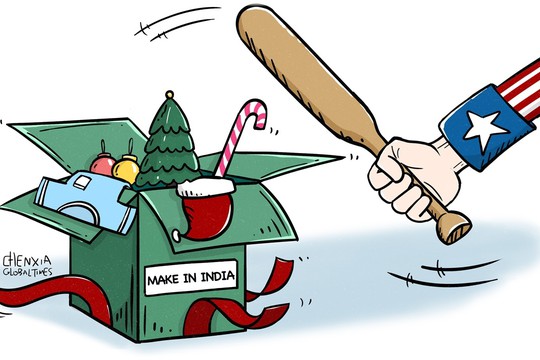Pic.: GT
While the US "decoupling" push appears to be aimed directly at China, it is ultimately a form of trade protectionism intended to protect US domestic industries. In this light, even India, viewed as a potential alternative supplier for the US, is experiencing the strain, writes Chinese ‘The Global Times’.
Indian solar panels are facing US scrutiny for possible links to so-called "forced labor" in China, Reuters reported on Tuesday.
US Customs and Border Protection (CBP) has detained approximately $43 million in shipments of electronics equipment from India since October 2023 under the US "Uyghur Forced Labor Prevention Act (UFLPA)," according to agency data.
While it is unclear what specific types of electronics equipment the CBP has detained, the situation reflects the protectionist conundrums facing India as it develops its manufacturing sector.
Superficially, the detainment of India's electronics products may seem to be mainly targeting Chinese manufacturing, but in essence, it is aimed at protecting US interests by ensuring the competitiveness of American companies and the economy.
The trend is now clear – the US is increasingly inclined to adopt trade and industrial protectionist measures in order to boost its manufacturing revival, especially in the new-energy and other strategic sectors.
There is no denying that some of India's exports to the US, such as solar panels and textiles, are seen as alternatives to Chinese products for the US, but they are likely only temporary solutions.
In the long run, if Indian industries grow to compete with their US counterparts, which is inevitable, the US is bound to resort to tougher protectionist policies using various excuses.
Amid rising global trade protectionism, India faces much greater resistance in improving its position in the global industrial chain than China did in the past, when it comes to developing the manufacturing sector.
If anything, the US-led "decoupling" push aimed at squeezing Chinese manufacturing out of the global supply chain is unlikely to give India much time or opportunity for large-scale manufacturing growth.
In this context, India needs to diversify its export markets and seek more opportunities in the Asian industrial chain by strengthening cooperation with regional countries to jointly address the challenges of trade protectionism. India needs to enhance trade cooperation with other developing countries in order to collectively uphold the smooth functioning of international trade.
read more in our Telegram-channel https://t.me/The_International_Affairs

 11:52 04.09.2024 •
11:52 04.09.2024 •























